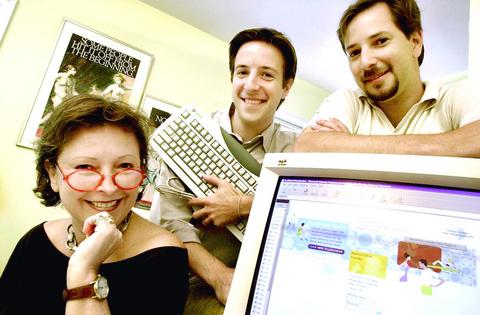Two thirds of singles in Britain looking for love turned to
electronic dating agencies last year, figures published in the Times showed this week.
Experts believe that online dating has revolutionized the dating game and become a "perfect example of technological Darwinism."

PHOTO: NY TIMES NEWS SERVICE
A survey by Parship.co.uk, the British subsidiary of Europe's largest dating service with more than 1.5 million members, reported that 3.6 million Britons used online dating services last year.
That amounts to 65 percent of the 5.4 million Britons who were looking for a relationship and used a dating service last year.
A spokeswoman for Relate, a leading British relationship counselling agency, said, "The Internet is the way people are looking these days. The stigma from dating agencies seems to have gone."
According to the Times, there are more than 100 independent online dating agencies in Britain, chasing a market that is valued at about US$20 million and expected to rise to US$83 million by 2008.
Parship says that 50 percent of single people believe they will meet a suitable partner through the Internet, up from 35 percent six months ago.
Chris Simpson, commercial director of the agency Telecom Express, said that greater interaction on the Internet had lured singletons online.
"If you could pick one single thing that's changed everything, it's the ability to see a picture of the person," he said.
At the top end of the online dating business, companies were emulating some of old agencies' attention to detail by asking clients to fill out extensive questionnaires.
This "weeded out" half-hearted fling-seekers and improved the chances of finding a good match.
Parship uses detailed psychometric tests similar to the personality profiles that many large companies employ to screen potential employees.
Love and Friends, an agency which has 75,000 British members, asks singletons to spend about an hour completing its form.
Mary Balfour, founder of Love and Friends, where a full "hand-holding" matchmaking service can cost more than US$8,800, said the Internet had revolutionized the dating industry by raising its profile and placing a new reliance on getting to know a date before meeting.
"It's like a return to old-fashioned love letters," she said. "You don't base your initial judgment on how someone looks but what their profile is like."
"Everybody you know who is single these days has at least had a good look at a dating Web site, introduction agency or personal ad.
"They have to, because all the old matchmaking institutions have gone, from the Church, the extended family, local community and factory floor to the ball and party circuits," added Balfour.
Richard Giordarno, a lecturer on Web-based social forms at Birkbeck College in London, said that electronic dating conferred a degree of control that people could never obtain from a face-to-face encounter.
"You can pick and choose the person you want to meet and you have control over the way you display yourself," he told the Times.

May 11 to May 18 The original Taichung Railway Station was long thought to have been completely razed. Opening on May 15, 1905, the one-story wooden structure soon outgrew its purpose and was replaced in 1917 by a grandiose, Western-style station. During construction on the third-generation station in 2017, workers discovered the service pit for the original station’s locomotive depot. A year later, a small wooden building on site was determined by historians to be the first stationmaster’s office, built around 1908. With these findings, the Taichung Railway Station Cultural Park now boasts that it has

Wooden houses wedged between concrete, crumbling brick facades with roofs gaping to the sky, and tiled art deco buildings down narrow alleyways: Taichung Central District’s (中區) aging architecture reveals both the allure and reality of the old downtown. From Indigenous settlement to capital under Qing Dynasty rule through to Japanese colonization, Taichung’s Central District holds a long and layered history. The bygone beauty of its streets once earned it the nickname “Little Kyoto.” Since the late eighties, however, the shifting of economic and government centers westward signaled a gradual decline in the area’s evolving fortunes. With the regeneration of the once

The latest Formosa poll released at the end of last month shows confidence in President William Lai (賴清德) plunged 8.1 percent, while satisfaction with the Lai administration fared worse with a drop of 8.5 percent. Those lacking confidence in Lai jumped by 6 percent and dissatisfaction in his administration spiked up 6.7 percent. Confidence in Lai is still strong at 48.6 percent, compared to 43 percent lacking confidence — but this is his worst result overall since he took office. For the first time, dissatisfaction with his administration surpassed satisfaction, 47.3 to 47.1 percent. Though statistically a tie, for most

In February of this year the Taipei Times reported on the visit of Lienchiang County Commissioner Wang Chung-ming (王忠銘) of the Chinese Nationalist Party (KMT) and a delegation to a lantern festival in Fuzhou’s Mawei District in Fujian Province. “Today, Mawei and Matsu jointly marked the lantern festival,” Wang was quoted as saying, adding that both sides “being of one people,” is a cause for joy. Wang was passing around a common claim of officials of the People’s Republic of China (PRC) and the PRC’s allies and supporters in Taiwan — KMT and the Taiwan People’s Party — and elsewhere: Taiwan and